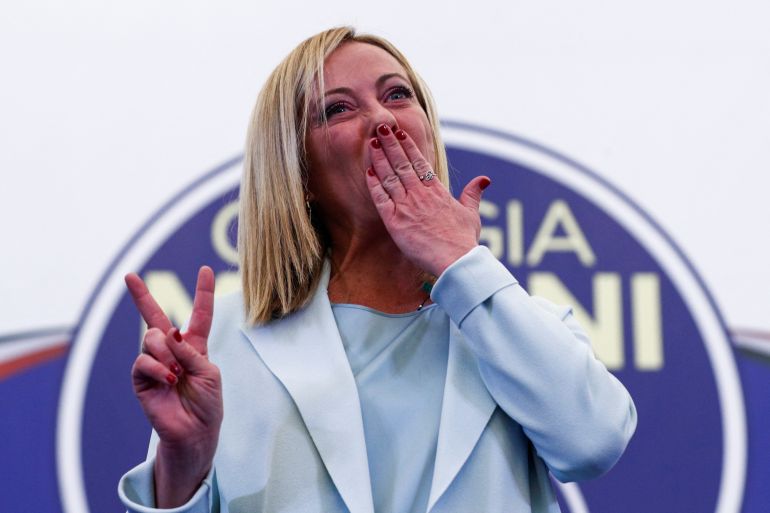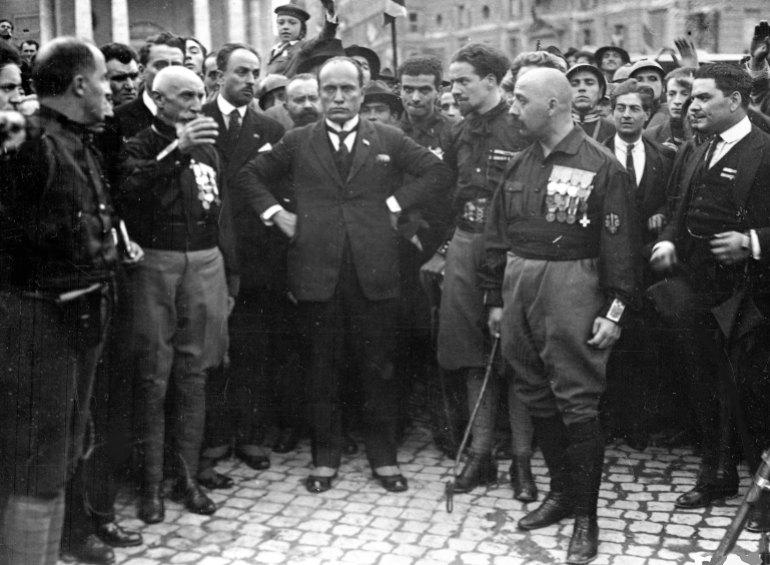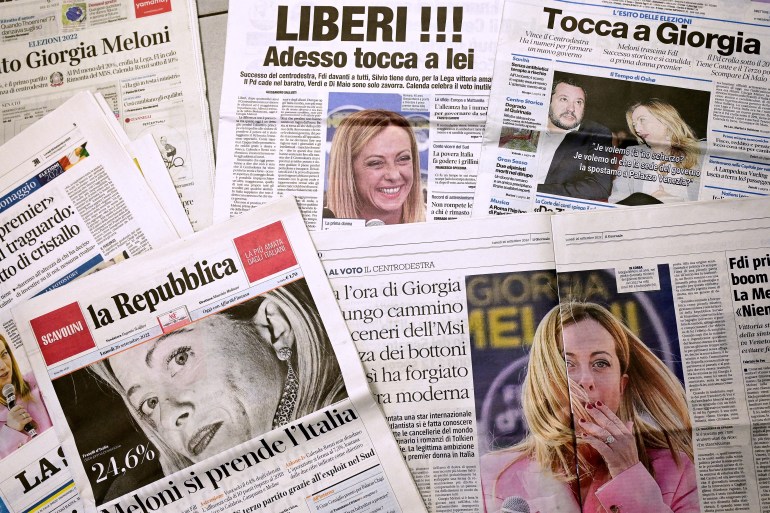Giorgia Meloni is on track to win. What’s next for Italy?
What is going to be Brothers of Italy stance with the EU, and are its members’ experienced enough?

Rome, Italy – It was never in doubt. As pollsters had predicted throughout a chaotic election campaign, Italy is set to be led by its most hard-right government since World War II.
Far-right leader Giorgia Meloni, a largely peripheral figure in Italian politics up until a few years ago, emerged triumphant in Sunday’s election. The 45-year-old is now expected to become prime minister, leading a right-wing coalition that garnered more than 43 percent of the vote.
Keep reading
list of 3 itemsItaly election: Energy woes prompt voter apathy, anguish
Will a right-wing win push Italy towards Russia?
“If we are called upon to govern this nation, we will do so for all Italians, with the aim of uniting people rather than dividing them, to make them proud of being Italians, to wave the Italian flag,” Meloni said in the early hours of Monday, in a brief speech after the first projections result. “You chose us, and we will not betray you,” she said, visibly emotional.
Campaigning under the slogan of “God, family and homeland”, Meloni ran an aggressive campaign calling for the preservation of Christian identity and the “traditional” family, and of a country populated first and foremost by Italian patriots.
Critics warn that such a vision is one of exclusion and that a Meloni-led government will be one where civil rights are at risk — especially for the gay community — where access to abortion will be restricted, and where the lives of refugees and migrants, both new arrivals and those living already in Italy, will be increasingly hampered.
The far-right leader has also pledged to impose a naval block and push back “masses of illegal immigrants”, while putting Italians’ interests above everything in the European Union.
Her approach to the EU reflects years of bad blood.

Founded in 2012, Brothers of Italy seized on a growing popular discontent triggered by the eurozone’s debt crisis, for which it blamed “European bureaucrats” and financial markets. The tone is now more sober, but the substance remains the same, according to critics.
“Her international allies reflect her extreme-right political vision which will make it difficult to maintain good ties with European institutions,” said Pieri Ignazi, professor of political science at Bologna University, referring to Hungary’s Viktor Orban, France’s Marine le Pen and Spain’s Vox party that hopes to win the same success in next year’s elections. “Her position is to limit the process of integration of the European Union and give back power to each nation,” he added.
Ignazi points to the refusal last week by Meloni to join the EU parliament in condemning Hungary for democratic violations. “Such protective behaviour with Orban shows an acceptance of what he did in terms of rule of law limitations and of freedom of expression,” he said.
While other far-right politicians in Europe like French ultra-nationalist Eric Zemmour and Vox party leader Santiago Abascal have rushed to congratulate Meloni on her victory, more mainstream leaders have been more cautious.
French President Emmanuel Macron said he respected the “democratic choice” of the Italian people, adding that as “neighbours and friends” the two countries would continue to work together, while Prime Minister Elisabeth Borne said France would keep a close eye on abortion and human rights in Italy.
The European Commission said it hoped for a constructive relationship with Italy’s next government.
The election was an unprecedented victory for the Brothers of Italy considering it polled at just 4 percent in 2018. But questions are now being asked about how the party, whose members mostly have experience only in local politics, will be able to find candidates able to fill the shoes of ministers.
“This is a party that is used to standing outside the system, which hasn’t had many occasions to grow its leadership,” said Gregory Alegi, professor of History and Politics at Luiss University. “Now that it has reached the government by skipping an intermediate step … is going to be a problem,” he said. An issue that could emerge even further at the EU level where politicians need to know how to navigate often complicated negotiations, Alegi said.
The party will essentially be learning on the job, but at the same time as Italy is preparing to go into winter amid a biting energy crisis and high inflation. The new leadership will need knowledge, Alegi said, but also the support of the EU especially as the country is receiving the biggest chunk of an EU recovery fund.

Washington is also watching closely.
Meloni has been clear over her support for Ukraine and sanctions against Moscow, but her coalition partners have openly expressed sympathy for Russian President Vladimir Putin. Salvini, a longtime admirer of Putin, has repeatedly insisted sanctions should be reconsidered.
Former Italian Prime Minister Silvio Berlusconi, for his part, has struck up a personal friendship with the Russian leader, and the two have even taken holidays together. The 85-year-old said on Thursday that Putin only wanted to replace Ukrainian President Volodymyr Zelenskyy with a government “made up of decent people”, but he met “unexpected resistance” on the ground.
“We are ready to welcome any political force able to show itself more constructive in relations with Russia,” Kremlin spokesperson Dmitri Peskov said following the elections.
Before the campaign, Meloni got her coalition partners to agree on support for Ukraine. And the relatively poor performance in the election of Salvini’s League, compared with the Brothers of Italy, has strengthened her position.
Experts say the risks for Italy in departing from its decade-long transatlantic alliance are simply too high.
“Considering Italy’s interests and interconnections there is no tactical advantage in running outside the Western alliance,” Alegi said.
“I don’t expect a U-turn in the midst of a highwayman, the political price would be too high.”